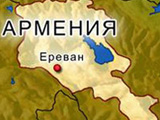|
|
TODAY.AZ / World news
Armenia still argues that government has no interest in stemming emigration
23 November 2011 [10:09] - TODAY.AZ
 Armenia argue that the government has no interest in stemming emigration, said in his article in the magazine “The National Interest” senior Associate at the Carnegie Endowment for International Peace Thomas de Waal.
Armenia argue that the government has no interest in stemming emigration, said in his article in the magazine “The National Interest” senior Associate at the Carnegie Endowment for International Peace Thomas de Waal.The author says “many of apartment blocks are half-empty, thousands of people have simply gone. Even as the world marked the birth of its seven billionth person last month, a few countries are confronting the problem of insufficient population. The last Soviet census put the population at 3.3 million, two-thirds urban and one-third rural. Half of that rural population may now have emigrated in search of work, plus considerable numbers of urban dwellers too”.
“The last official census in 2001 put Armenia’s population at just over three million. Most people believe it is a lot worse than that. The drop in numbers came despite the fact that as many as 400,000 people entered Armenia in 1989–92. Around a million people may have left the country since the end of the Soviet period”, the article states.
“Armenia is a small, landlocked country. The problem is compounded by the fact that twice as many Armenians live in the worldwide diaspora as inside, and they draw their relatives abroad. Now the issue is causing problems with Armenia’s main ally, Russia. Prime Minister Tigran Sargsyan publicly expressed worry over the Russian government’s scheme, entitled Compatriots, to give thousands of Armenians the promise of citizenship and work if they move to depopulated parts of Siberia. In effect, one ally is resolving its demographic problems at the expense of another. Opposition supporters I spoke to in Armenia argue that the government has no interest in stemming emigration. It acts as a pressure valve against the kind of disgruntled masses who can undermine governmental authority, they say, and allows authorities to produce inflated electoral rolls so they can falsify election outcomes more easily. Moreover, remittances help keep the country afloat. But it’s difficult to see the country developing while it is sapped by emigration”, the author notes.
/AzerTAc/
URL: http://www.today.az/news/regions/98614.html
 Print version
Print version
Views: 1396
Connect with us. Get latest news and updates.
See Also
- 24 February 2026 [21:43]
Apple moves some desktop production to US - 24 February 2026 [21:22]
NASA delays Artemis rocket launch for urgent repairs - 24 February 2026 [20:40]
Malaysia’s labor productivity rises in 2025 - 24 February 2026 [20:21]
Why China’s AI surge is no longer catching up but setting pace [Op-Ed] - 24 February 2026 [18:41]
SOCAR to cut drinking water use through recycling and closed-loop systems - 24 February 2026 [18:05]
France bars US ambassador from official meetings after ignoring foreign ministry summons - 24 February 2026 [15:42]
Ursula von der Leyen and Antonio Costa visit Kyiv, reaffirm EU’s unwavering support for Ukraine - 24 February 2026 [14:42]
Former UK ambassador Peter Mandelson detained in London over Epstein-linked probe - 24 February 2026 [14:25]
Slovakia halts electricity supplies to Ukraine - 24 February 2026 [12:25]
US top general Caine thinks war with Iran can be 'easily won'
Most Popular
 Guarantees of peace from Armenia: questions remain
Guarantees of peace from Armenia: questions remain
 Azerbaijan aligns with China’s Belt and Road strategy through Middle Corridor
Azerbaijan aligns with China’s Belt and Road strategy through Middle Corridor
 Trump weighs military strike on Iran as Pentagon presents options
Trump weighs military strike on Iran as Pentagon presents options
 Greece working with another 4 European countries to set up migrant deportation hubs outside EU
Greece working with another 4 European countries to set up migrant deportation hubs outside EU
 UNESCO celebrates International Mother Language Day
UNESCO celebrates International Mother Language Day
 Azerbaijan Defense Ministry releases weekly summary video [VIDEO]
Azerbaijan Defense Ministry releases weekly summary video [VIDEO]
 Turkish Parliament to host event on 34th anniversary of Khojaly Genocide
Turkish Parliament to host event on 34th anniversary of Khojaly Genocide
